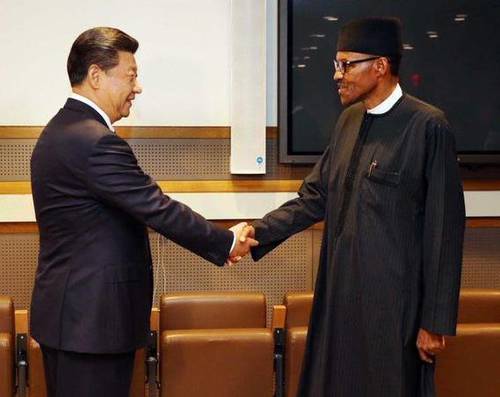 The EXIM Bank of China is Nigeria’s biggest bilateral creditor in nearly 2 decades, having lent the African largest economy $6.5 billion (or N1.9 trillion) since 2002, analysis of official disclosures exclusively obtained by PREMIUM TIMES has shown.
The EXIM Bank of China is Nigeria’s biggest bilateral creditor in nearly 2 decades, having lent the African largest economy $6.5 billion (or N1.9 trillion) since 2002, analysis of official disclosures exclusively obtained by PREMIUM TIMES has shown.
Based on separate Freedom of Information replies by the finance ministry and the Debt Management Office, DMO, our analysis showed Nigeria has obtained 17 Chinese loans to fund projects across sectors since 2002.
Transportation and ICT sectors have six projects each financed by loans from the Chinese bank, while energy, agriculture and water sectors, respectively, have three and two projects tied to Chinese loans.
The first Chinese loan to Nigeria was agreed on March 27, 2002: $114.89 million each for constructing two 335 MW gas power plants, namely Omotosho and Papalanto (Olorunshogo) in Ondo and Ogun State, respectively. Both plants were completed in 2007. The loan was obtained at six per cent interest rate. The loan covered 65 per cent of the costs of the project, while Nigeria then covered the 35 per cent balance.
Four months after, two other loans totalling $159.83 million for rural telephony were offered at a 3.5 per cent interest rate. Then from 2006 to September 2018, the country obtained 13 more loans, at between 2.50 per cent and 3 per cent interest rates. The last loan obtained by the government from China was $328 million used for the National ICT Infrastructure Backbone II Project.
Loans for opaque and controversial projects
A PREMIUM TIMES’ review of the projects for which the loans are obtained revealed that they range from opaque to controversial. For instance, the loans were obtained for the provision of public security/communication system (more commonly known as CCTV project), 40 parboiled rice processing plants, and for infrastructural projects like the ongoing Lagos-Ibadan railway and the upgrade of the Abuja-Keffi-Makurdi road.
The agreement for the $399.50 million loan for the public security communication project handled by ZTE was reached on December 12, 2010, with a 19-year tenor at 2.50% interest rate. Nigeria’s federal legislature has repeatedly queried the delivery of the project, whose major component – surveillance videos in Lagos and Abuja – has barely ever worked. Yet, the country will continue to service the loan until September 2030, the maturity date.
The rice processing plants project was backed with $325.67 million loan agreed on April 26, 2016, according to the DMO in its disclosure dated July 18. But in another disclosure, on October 8, by the ministry of finance, it was excluded. PREMIUM TIMES could not find further public information about the loan.
Advertisement
In their FOI disclosures, both the DMO and the ministry of finance withheld details of outstanding debts or the sums Nigeria has since repaid.
Nigeria’s current external debt stock amounts to $27 billion, the DMO stated on its website.
If no further loan is taken from China, Nigeria would still be serving the Asian power’s loans till around 2038, the maturity date for the last loans obtained in 2018.
But Nigeria is hoping the EXIM Bank of China will approve a new $5 billion loan to finance the 3,050 MW Mambilla hydropower project. The Mambilla project in Taraba State, northeastern Nigeria, is one of Africa’s biggest dam projects but it has been stalled for over 40 years.
Debt conundrum
Already, a quarter of Nigeria’s N10.3 trillion (proposed) 2020 budget, that is N2.5 trillion, goes to debt servicing. The budget is still being considered by federal lawmakers.
Chinese loans are disbursed by the EXIM Bank, with interest subsidised by the country’s ministry of commerce, which assigns (Chinese) contractors to execute projects tied to the loans. This chain barely allows cash to get into the hands of the recipients; rather, the loans are offered in the form of projects
Between 2000 and 2017, China extended African countries $143 billion loans, and Angola is the top recipient with approximately $43 billion received since 2002, according to the China Africa Research Initiative at the John Hopkins University in the United States.
Ethiopia, Kenya, South Africa, Sudan, DR Congo and Egypt, among others, are other African big borrowers from China.
Since the turn of the century, China has increasingly had expansive presence in Africa as a donor and trade partner. Although the United States remains Africa’s biggest donor, China is threateningly rivalling the traditional Western donors in the latter’s historically cultivated sphere of influence, that is, Africa.
The popularity of China among Africa leaders, analysts say, is due to its approach to aid. Its loans are mostly non-conditional and without interference. They also have a low-interest rate and sometimes, natural resources are used for repayment, for instance in Angola.
By not attaching human rights, environmental and governance requirements to its aids, critics say China is worsening authoritarianism in Africa. Others also criticise Chinese aids and loans for their opacity and poor standard. Some also say China underprices Africa resources and are steep in labour abuses in the continent.
But pro-China analysts say using resources to repay loans helps cover critical infrastructural deficits in the continent. They say China’s involvement in Africa offers a “win-win” situation – trading abundant resources for rollback infrastructural deficit.
In the case of Nigeria, natural resources are not used to repay loans.
“No, we are using our own money to repay the loans, unlike other countries,” one official said, seeking anonymity.
Under late President Umaru Yar’Adua, China once unsuccessfully approached Nigeria with $50 billion crude oil-backed loans to finance various infrastructural projects, including oil refineries, according to former presidential spokesperson Segun Adeniyi, in his book on the Yar’Adua administration, Power, Politics and Death.
But this may not be the case for long as repaying loans with natural resources such as crude oil is increasingly being considered, the official said.
Source: Premiumtimes











